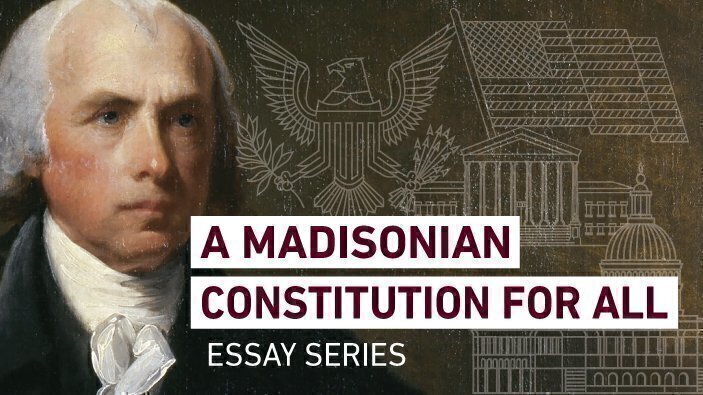Essay Series

A Madisonian Constitution for All Essay Series takes a wide-ranging look at what James Madison, considered the father of the Constitution, and the other framers of the U.S. Constitution would think about our current presidency, Congress, courts, and media, and how we can resurrect Madisonian values of constitutionalism, public reason, and the rule of law in a polarized age. Contributors included Sarah Binder of The George Washington University, Colleen Sheehan of Villanova University, Daniel Stid of the William and Flora Hewlett Foundation, Michael Stokes Paulsen of the University of St. Thomas School of Law, Saikrishna Prakash of the University of Virginia School of Law, Jack Rakove of Stanford University, Greg Weiner of Assumption College, and Sean Wilentz of Princeton University.
Introduction
By Michael Gerhardt and Jeffrey Rosen of the National Constitution Center
Michael Gerhardt and Jeffrey Rosen take a look at the scholars participating in this essay series and how they offer insights on the Madisonian Constitution, the likely developments undermining its objectives, and possible solutions for its restoration.
Read Online | Get PDF
A Madisonian Constitution for All Essay Series eBook
View the A Madisonian Constitution for All Essay Series eBook featuring the introduction and all essays in one place.
View eBookThe Presidency
From a Fixed, Limited Presidency to a Living, Flexible, Boundless Presidency
By Saikrishna Prakash of the University of Virginia School of Law
Saikrisha Prakash argues that the Constitutional Convention created a Presidency that was stronger than is commonly recognized today, but that events over the following two centuries have made the Presidency stronger still, and have erased most of the Constitution's key limits on presidential power.
Read Online | Get PDF
The Constitution, the Presidency, and Partisan Democracy: Congress Revises the Electoral College, 1803-1804
By Sean Wilentz of Princeton University
Sean Wilentz explores the drama around the original Electoral College in the elections of 1796 and 1800, leading to the adoption of the Twelfth Amendment in 1804, to show that James Madison and the other Framers were just as familiar with the rough-and-tumble of presidential politics as we are today.
Read Online | Get PDF
Congress
Revisiting and Restoring Madison’s American Congress
By Sarah Binder of The George Washington University
Sarah Binder says that, while Madison's vision for Congress has been a sweeping success throughout American history, increased political polarization has weakened Congress and made it harder for it to play its intended constitutional role.
Read Online | Get PDF
Recovering a Madisonian Congress
By Daniel Stid of the William and Flora Hewlett Foundation
Daniel Stid considers the different factors, chiefly political polarization, that have led Congress to abdicate so many of its powers to the President, and explores a number of reforms that could help restore the Congress that Madison envisioned.
Read Online | Get PDF
The Courts
The Relevance and Irrelevance of James Madison to Faithful Constitutional Interpretation
By Michael Stokes Paulsen of the University of St. Thomas School of Law
Michael Stokes Paulsen discusses Madison's views toward constitutional interpretation, which he viewed as equally the province of each branch of government, not just the courts, and believed must follow the text of the Constitution as originally understood.
Read Online | Get PDF
James Madison and the Judicial Power
By Jack Rakove of Stanford University
Jack Rakove explores one of Madison's ideas that was not adopted by the Constitutional Convention: a "council of revision" including the President and the Supreme Court that would address constitutional problems with laws passed by Congress.
Read Online | Get PDF
The Media
Madison’s America: Deliberative Republicanism, Political Communication, & the Sovereignty of Public Opinion
By Colleen Sheehan of Villanova University
Colleen Sheehan contends that, while Madison did seek to prevent "tyranny of the majority," he also wanted to empower national majorities to govern wisely. But advances in technology and increased polarization have undermined the "deliberative Republic" Madison envisioned.
Read Online | Get PDF
'The Ultimate Justice of the People’ Madison, Public Opinion and the Internet Age
By Greg Weiner of Assumption College
Greg Weiner says that Madison believed in the sovereignty of public opinion but that true public sentiment forms gradually through deliberation, giving time for passions to cool. Modern advances in technology have undermined this vision, as public opinion now forms almost instantaneously.
Read Online | Get PDF







